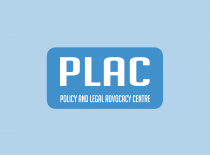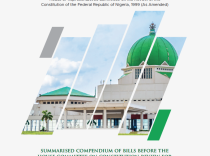The House of Representatives held a Public Hearing on Wednesday, 10 and Thursday, 11 June 2020 on a “Bill for an Act to Repeal the Quarantine Act and Enact the Control of Infectious Diseases Act, Make Provisions Relating to Quarantine and Make Regulations for Preventing the Introduction into and Spread in Nigeria of Dangerous Infectious Diseases, and for Other Related Matters (HB. 836).”
The Bill is sponsored by the Speaker of the House, Rt. Hon. Femi Gbajabiamila, Chairman of the House Committee on Healthcare Services, Hon. Tanko Sununu and Chairman of the House Committee on Health Institutions, Hon. Pascal Obi. The hearing was therefore organised by these committees in conjunction with the House Committee on Justice.
The Public Hearing, which held over a two-day period at the National Assembly Complex saw the participation of diverse stakeholders ranging from government agencies to civil society organisations, religious and professional bodies and special interest groups who came in their numbers to make their views on the controversial bill known. According to the organising committees, over one hundred memoranda were received from the public ahead of the public hearing.
The bill had created a public furore following its introduction in the House of Representatives earlier in May 2020 and an attempt to schedule a same day consideration of the bill when it came up for second reading. Members of the House had raised concerns over the attempt to fast-track the bill through the required legislative stages without adequate time being allowed for a thorough study of its contents to inform opinions and contributions to the planned consideration of the bill. To make matters worse, it was discovered that most of its contents was a duplicate of a similar Singaporean Law, which contains several provisions empowering State authorities to authorise extensive restrictions of human rights and freedoms for the purpose of protecting public health.
Following the uproar and criticisms of the bill, the Speaker of the House of Representatives committed to holding a public hearing on the bill to enable stakeholders and the general public to make inputs on the bill. Taking into consideration, the COVID-19 pandemic and social distancing rules, the hearing held on two consecutive days with primary stakeholders such as the Nigeria Centre for Disease Control (NCDC), Ministry of Health, and the Nigerian Governors’ Forum (NGF) participating.
The presentation by Governor Kayode Fayemi of Ekiti State, Chairman of the Governor’s Forum was a major highlight of the event. In his submissions, he stated that the bill ignores the federal system of Nigeria by failing to recognise the role and authority of State Governments to adopt measures to control the outbreak of infectious disease in their areas. He added that while the intention to propose a new legislation may be good, the bill’s provisions are undemocratic and in conflict with the Constitution. He then called on the National Assembly to ensure that the revised bill takes into consideration, the power of state governments to issue declarations and regulations in occasions of an infectious disease outbreak. This position was echoed by several other groups that made presentations at the hearing such as the Nigerian Medical Association, National Primary Healthcare Development Agency (NPHDA), Joint Health Workers Union (JOHESU), National Council of Women Societies (NCWS), Amnesty International etc.
Representatives of public health agencies stressed on the need to utilise and strengthen existing structures for disease surveillance as they are currently weak. For instance it was noted that the National Primary Health Care Development Agency (NPHCDA) currently plays a key role in disease surveillance, which can feed into the NCDC’s work during emergencies. This is because the NCDC is more of an administrative body with little staff on ground to do field work across the country. The NPHCDA on the other hand already have experienced officers who are useful in gathering evidence of infections at the local level. As the agency is also experienced with vaccinations, it was proposed that the NCDC should be partnering with them on this issue. Apart from working with existing structures, it was also recommended that the powers being proposed for the NCDC should be decentralised so as to make response more effective. Closely related to this is the need to strengthen community participation and involvement that can inform and feed into the system.
Civil society organisations and human rights groups such as Amnesty International Nigeria focused on the issue of potential abuse of powers by the NCDC to whom wide powers are granted, the constitutionality of the proposed law and provisions that restrict rights to peaceful assembly, liberty, human dignity etc. It was stressed that public health crises response should be proportional to the objective it seeks to achieve, that the bill should not criminalise every infraction of its provision and that the community care model, which is more effective than compulsory treatment should be utilised to encourage desired actions.
Representatives of churches and religious groups expressed concerns about forced vaccinations and disposal of the bodies of persons who die of infectious diseases. For instance, it was argued that vaccinations can be used as a means of population control and could also harm unborn children. Therefore, the rights of the unborn to be protected against harm as guaranteed by section 17 of the Child Rights Act should be protected. It was also argued that the bill authorises orders on disposal of corpses in a way that subjects dead bodies to abuse and infringes on religious rights.
Groups representing interests such as pathologists, veterinarians, and traditional medical practitioners, felt the bill failed to take into consideration, available knowledge and experiences from these fields in curbing public health crises.
Below is a summary of points raised and contributions made by the various participants at the hearing:
- States and Local Governments should be allowed to promulgate regulations and protocols for controlling Infectious Diseases
- A task force should be set up during public health emergencies to adequately respond to the issue. The bill could consider setting up a committee domiciled in the Federal Ministry of Health to respond to health emergencies.
- Overreaching powers of DG and Police Officers should be reviewed
- The provisions on seizure of property and closure of business should be reviewed.
- Provisions on arrest of offenders without warrant provisions are too liberalised. Conditions for exercising such power should be made stringent.
- The broader term “Healthcare provider” in the bill should replace “medical health practitioner” to cover the gamut of persons that provide health care services even though they are not members of the Nigerian Medical Association as indicated in the bill. The bill could define a healthcare provide as a person providing medical service under the National Health Care Act.
- Portions of the bill speaking to infections from Animals or destruction of animals during the spread of an infectious disease conflicts with existing provisions in the Animal Disease (Control) Council Act and Veterinary Surgeons Act. The NCDC staff are not animal disease experts therefore the Bill should focus on infections among humans and not animals.
- The provisions of the bill do not sufficiently address the issue of Quarantine. The definition of “quarantine” is vague and should be better articulated.
- Portions of the Bill that conflict with the provisions of the NCDC Act should be reviewed.
- The powers of the President to declare a health emergency as stated in the bill is inconsistent with section 305 of the Constitution on declaration of emergencies by the President.
- Provisions on jurisdiction of the Magistrate Court should be reviewed because there are fundamental human rights issues in the bill over which the High Court has jurisdiction.
- The bill does not address bio-terrorism and permits for importation of biological and live organisms in Nigeria.
- The role of Traditional Medicine Practitioners Association of Nigeriashould be captured in the bill as they have indigenous knowledge on local treatment of diseases.
- The responsibility for inquiring into the failure of medical practitioners or healthcare providers to make necessary disclosures of suspected cases of infectious diseases and the response to offences thereto should be left to their regulatory bodies.
- The bill does not indicate who should pay for medical investigations.
- There is nosavings provision for the subsidiary legislation in the bill which deals with Quarantine of Ships.
- There is no provision on funding the bill.
- Trachoma and infectious disease of the eye should be included as an infectious disease as it has been identified as a public health problem in 44 countries across the world.
- Viral hemorrhagic fever i.e. Lassa Fever should also be included.
- The bill should be stepped down to create an enabling environment for Nigerian universities to develop vaccines that are safe for children and women.
- There should besensitisation of bill in local /rural areas for women to understand their rights and how the bill affects them. The National Assembly should also show the same zeal on bills dealing with gender equity.
- The term “Health Officer” should be properly defined.
- The provision that mandates a person in charge of a laboratory to report cases of infectious diseases should be amended to place the onus of reporting on the person who performed the test, and not the owner.
- The use of the term “clinical laboratory” is misconstrued in the bill. It should be modified to “medical laboratory” as “clinical laboratory” is restrictive.
At the end of the two-day hearing, the Committees committed to considering every submission made and using it to revise and improve on the provisions of the bill in a way that responds to the rights and concerns of Nigerians.
It would be recalled that the Senate has a similar bill titled “National Health Emergency Bill, 2020” which was also introduced in May 2020 and is awaiting second reading.





